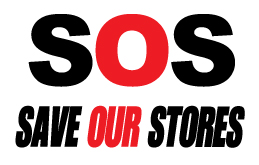Issues
When SOS was launched in 2017, the campaign focused on the following 5 issues impacting our members. Since election, the Ford government has announced several measures impacting our member’s bottom line. Here is our assessment of the issues to date:
Contraband Tobacco
Convenience store owners are licensed tobacco retailers who play by the rules, collect and remit all tobacco taxes to the government, and face steep fines and penalties for breaking any of laws under the Smoke Free Ontario Act. Yet contraband manufacturers and traffickers continue to flourish across the province, with little consequences.
- Legal tobacco sales and the in-store purchases made by customers buying tobacco represent the largest volume of convenience store sales. Losing sales to illegal operators is devastating to the bottom line of convenience store operators and robbing the government of an estimated $1 billion per year in lost tax revenue.
- An estimated 30-40 % of all tobacco consumed in Ontario purchased from the illegal black market. In some communities levels are in excess of 75%.
- Next door in Quebec the government has taken concrete action to deal with a similar contraband problem there. Through increased law enforcement measures contraband levels have decreased to as low as 10%. There is a proven model for Ontario to follow yet this government fails to act.
After much promise, little has been done to combat the harmful impacts of unregulated, illegal tobacco in Ontario. The current government promised changes, yet, has seemingly lost interest. Why? For more information please visit our CONTRABAND page.
Skyrocketing Hydro Bills
Over the last five years, convenience store owners have seen their monthly electricity bills double and even triple in some cases. They need long term Hydro rate relief and sustainability to keep their businesses viable.
- Many of the products consumers look for in a convenience store are found in one of the store’s refrigeration or freezer units: cold sodas and energy drinks, ice cream bars and popsicles. But all of that refrigeration means higher electricity bills at a time when Hydro rates are skyrocketing in Ontario.
- Ontario store owners pay higher electricity rates than store owners in any other province.
- For some store owners, escalating electricity costs were the final straw in their ability to keep their stores open.
We are inspired and hopeful about Ford’s commitments to lower hydro rates for small business. We hope more can be done to assist small business owners to retrofit and upgrade their operations to save money on their electricity bills.
Red Tape and Excessive Regulations
Over the last 14 years the Ontario Liberal government has increased a long list of regulations and ramped up in-store inspections that have caused undue stress and hardship. Meanwhile, illegal competition goes unchecked.
Beverage Alcohol Sales
The current Ontario government is dead set against expanding the sale of alcohol to convenience stores. But consider the following:
- There are more than 200 agency stores in small-town Ontario already operating as responsible retailers of beverage alcohol.
- Convenience stores, much like their name suggests, provide greater convenience to consumers because they are open longer and within walking distance of many people’s homes.
- Convenience store owners in most other provinces in Canada have proven to be responsible alcohol retailers.
We are very excited about the Ford government’s modernization of alcohol sales in Ontario, including allowing beverage alcohol sales in Ontario Convenience Stores. We support the addition of 300 more LCBO Convenience Outlets to small and rural communities, and we look forward to C-stores gaining access to beverage alcohol products.
Minimum Wage Increase
The proposed increase to the Ontario minimum wage announced in May will especially impact independent convenience stores.
- The Ontario government promised several years ago that any increase to the minimum wage would be tied to inflation. But now it wants to hike the minimum wage by more than 32% virtually overnight.
- Convenience stores have traditionally been a place where high school students get their first part-time jobs earning minimum wage. But the massive increase to the minimum wage is simply not manageable for many small businesses, especially convenience stores. The result will be longer hours for store owners and their family members, as well as increased youth unemployment.
We greatly support the Ford government’s decision to freeze the scheduled $1.00/hr increase in 2018. Our members are not opposed to increasing minimum wage but the previous government’s massive increase was too much, too soon.
